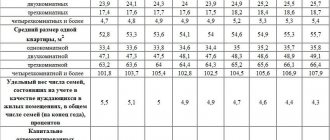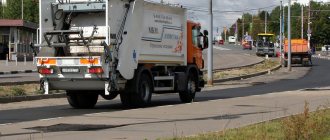Silence law and renovation work
Requirements for the maximum permissible noise and liability for exceeding it are provided for:
- Federal Law of March 30, 1999 No. 52-FZ;
- Sanitary standards SN 2.2.4/2.1.8.562-96, which indicate the time frame for noisy work and restrictions on the maximum volume of work;
- Regulatory acts of the constituent entities of the Russian Federation, which provide for administrative liability for violating silence.
In case of disturbing the peace of Russian citizens, the violator can actually be punished in a completely legal way. Where to contact regarding non-compliance with the law on silence If you find yourself in a situation where your neighbors disturb your peace with “noisy” actions at the wrong time, write a complaint against them (of course, after preliminary peaceful negotiations).
Thus, according to the prescribed regulations, the permissible sound level in the premises should not exceed: From the picture it is clear that, for example, the operation of a hammer drill, the sound level of which is equal to 100 decibels, and even in the evening, will interfere with sleep not only of a small child, but also adults who want to relax after a hard day. If in your home you can hear the sounds of heels and the movement of chairs from the room located on the floor below, then questions should arise first of all about the thickness of the ceilings (floors and ceilings). Normally, such sounds should not be heard from the lower floor.
Therefore, leave one copy of the applications submitted to housing and communal services, homeowners' associations, Rospotrebnadzor and the district police officer with you
It is important to demonstrate in court an impressive evidence base:
- copies of statements;
- act on the examination carried out to identify the noise level;
- witness's testimonies;
- video recording the time when the noise was heard;
- audio recording of noise.
The restriction does not apply to new buildings that were put into operation less than one and a half years ago. According to the current amendments, the law on silence in the Nizhny Novgorod region establishes night time from 22:00 to 7:00 on weekdays and from 23:00 to 10:00 on weekends and holidays.
The use of televisions, radios, tape recorders, other sound reproducing devices, as well as sound amplification devices, including those installed on vehicles, temporary (non-capital) objects of the consumer market, resulting in a violation of the peace and quiet of citizens at night at protected objects in St. Petersburg, entails imposing an administrative fine on citizens in the amount of two thousand to five thousand rubles; for officials - from five thousand to ten thousand rubles; for legal entities - from twenty-five thousand to fifty thousand rubles. 2.
The exceptions to the Law on Silence in St. Petersburg of 2020 include: It is prohibited to disturb noise in any way, including listening to music, playing loud musical instruments, setting off firecrackers, fireworks, with the exception of New Year's holidays, and carrying out construction and installation work.
Law enforcement officers draw up a protocol and submit it to the inspector. He, in turn, conducts an explanatory conversation with the violators. Uninterrupted public transport movement is more paramount than the peace of Russians. All cities of the Federation adopt bills that would establish time limits for noise and penalties for violating them independently, according to the characteristics of a given region. The law on silence in Moscow was first created in 2002. Amendments and changes have been made to it several times. One of the latest innovations came into force on March 22, 2014. This bill toughens penalties for disturbing the peace on weekends and during vacations.
A significant increase in fines for both ordinary citizens and legal entities, as well as commercial and government organizations. For example, Moscow Law No. 45 of November 21, 2007 is in force in the capital. Article 3.13 of this Law provides for punishment for violating the peace and quiet of citizens.
Law on silence from January 1, 2020 in an apartment building
On weekends and holidays, noise is prohibited until 12:00. During this period it is prohibited:
- scream;
- carry out repair work or move furniture.
- watch TV or listen to music loudly;
Repair work cannot be carried out from 20:00 to 9:00. The restriction does not apply to new buildings that were put into operation less than one and a half years ago.
However, the law does not apply to:
- carrying out emergency and rescue operations;
- events planned by officials;
- state and city holidays.
Law on silence in St. Petersburg: how to protect your sleep
Please note: if you encounter noisy neighbors, you can simply call the police by phone. Representatives of law enforcement agencies will come to the site and establish the fact and identity of the violators, presenting requirements to eliminate all sources of excess noise
As an alternative method, you can directly write a statement to the sanitary and epidemiological supervision authorities or Rospotrebnadzor, indicating the address, number of the house or hostel where the violation of the law occurs. In this case, a full inspection of residential buildings will be initiated for compliance with the requirements of Federal Law CH 2.2.4/2.1.8. 562-96.2.2.4 with noise level measurement using special devices.
Law on silence St. Petersburg 2020
The so-called “Silence Laws,” which protect the peace of citizens at night, as well as on weekends and public holidays, have been adopted in almost all constituent entities of the Russian Federation. St. Petersburg is no exception.
At the same time, regulations on silence in the regions differ. Federal regulations establish noise level limits that cannot be violated during the day and at night.
For these actions, the “law on silence” in St. Petersburg 2020 provides for administrative liability in the form of a warning or a fine:
- for legal entities - from 50,000 to 200,0000 rubles.
- for individuals – from 500 to 5,000 rubles;
- officials - from 25,0000 to 50,000 rubles;
The only exception is New Year's celebrations.
Law on maintaining silence in St. Petersburg 2020
Contact the local police officer to bring your neighbor to administrative responsibility.
- 1,000 – 2,000 rub. for representatives of official bodies;
- 500 – 1,000 rub. for individuals;
- 1,000 - 20,000 rub.
Moreover, changes were proposed not only by federal officials.
People complained about the noise of repairs and loud music.
The people's representatives decided that it was easier to establish certain noise standards than to try to understand each specific conflict.
Juris Info
This article is directly devoted to the law on silence in St. Petersburg.
Let's talk about amendments for carrying out repair work, what sounds are not prohibited from making, at what time citizens have the right to make noise, what responsibility they will bear for violation, and so on.
- noise-absorbing cladding (applies to public buildings);
- layout that complies with standards;
- the presence of noise silencers in ventilation and air conditioning systems;
- vibration isolation (applies to plumbing).
- proper sound insulation;
In Russia, average night time starts at 23:00 and ends at 7:00.
Even if changes are introduced to the regulations, these conditions will definitely not be simplified, but will only be tightened for the benefit of citizens who need silence. For the northern capital, there is a law number 273-70, articles 8 and 38, regulating the issue under discussion.
How does the silence law in St. Petersburg protect local residents?
The peace of citizens living in the northern capital is protected by Law No. 273.
In contrast to federal standards, night time in the northern capital starts from 22:00 to 8:00.
They relate to the sanitary and epidemiological well-being of citizens living in Russia.
Important! Citizens are prohibited from exceeding the noise level from 22:00 to 8:00. Several amendments have been adopted in St. Petersburg that relate to repair work
Law on silence in new buildings 2019
It is not allowed to live in housing that does not meet these standards. The official text regulates the permissible sound volume level:
- during the day, 40 decibels is considered normal;
- A level of 30 decibels is set at night.
It is allowed to exceed the indicator by 15 units, but only during the day.
For example: 40 dB is the volume of speech, screaming is fixed at a level of 80 to 90 dB. The list includes sounds made by pets, noise made during renovations or rearranging furniture.
Types of liability
Liability is provided for failure to comply with the requirements of housing legislation and Sanitary Rules establishing the maximum permitted noise level.
Rice. 4. Fine for breaking silence. Source: Internet magazine about new buildings
Administrative responsibility
Based on a protocol drawn up by a police officer (establishing the fact of a violation) or an inspector from Rospotrebnadzor (based on a check of the permissible sound level), the head of the regional Office of Rospotrebnadzor makes a decision to bring the violator to administrative responsibility.
Table 3. Administrative liability under the Code of Administrative Offenses of the Russian Federation
| Norm of the Code of Administrative Offenses | Offender | Fine | Note |
| Article 6.3 | Entity | 10,000 – 20,000 rub. | Suspension of activities for up to 3 months is possible. |
| Individual | 100 – 500 rub. | If it is committed for the first time and the violation is minor, a warning is issued. | |
| Entrepreneur | 500 – 1,000 rub. | Suspension of activities for up to 3 months is possible. | |
| Article 6.4 | Entity | A management company, HOA, or store owners can act. | |
| Officials | 1,000 – 2,000 rub. | ||
| Individual | 500 – 1,000 rub. | ||
| Entrepreneur | 1,000 – 2,000 rub. | Suspension of activities for up to 3 months is possible. |
Administrative liability is also established by the Codes of Administrative Violations in force in each specific region.
Important! Since carrying out repair work at night is a violation of peace, quiet and order, that is, it encroaches on public order, police officers have the right to draw up reports on such violations.
Civil liability
Any person whose right to rest at a specified time is violated has the right to demand compensation for moral damage.
At the same time, as the Supreme Court of the Russian Federation established, if the rights of citizens to peace and quiet are violated, then the sanitary rules establishing the permissible sound level are not applicable, since they are not established for people, but regulate noise levels when using equipment installed in non-residential premises.
As proof that the offender has caused moral damage, it is necessary to submit to the court a certificate from a doctor confirming the occurrence of adverse health consequences due to the loud sound of the repairs.
Basic provisions
Free legal consultation
The federal law on silence was adopted by many regions; St. Petersburg was no exception in this sense, since the authorities perfectly understood the need for such a law specifically for the metropolis. Of course, as in most regions, the law on silence in St. Petersburg has undergone some changes. It is also called differently - the law “On Administrative Offenses”. But directly articles 8 and 38 of this law are devoted to protecting the peace of residents of apartment buildings at night and on weekends.
Article 8 of this law specifies what is prohibited:
Watching TV
No one can prohibit citizens from doing this, but it is important to adjust the volume so that extraneous sounds do not reach your neighbors. Listening to music in loud mode. Moreover, this applies not only to neighbors in apartments, but also to music coming from a car parked near the house. Screams, scandals, loud singing, whistling, barking dogs - these sounds perfectly penetrate the walls of high-rise buildings and disturb the peace of citizens. Loud playing of musical instruments. Even if the neighbor’s child goes to music school, this does not mean that the whole house should hear his rehearsals at inappropriate hours. Repair work, furniture rearrangements. Use of pyrotechnic devices
It is not only noisy, but also dangerous. There are people who try to launch such devices directly from their own balcony. Pyrotechnics are prohibited at any time of the day, the only exception being New Year's Eve. For launching fireworks at any time, a fine of 1,000 rubles has been established.
Regulation of the “noise law” and its application in the apartment in 2020
Also, the Moscow region has established more lenient fines for its residents. For example, for the first violation in 2020 you can receive a warning or a fine in the amount of 1000-3000 rubles, for a repeated violation within a year - 4000 rubles, but if you break the silence for the third time and further, then you will be required to pay 5000 rubles.
This is interesting: Promotions on air tickets 2019
But the Moscow region has already amended its law on maintaining silence. The latest edition is April 28, 2020. Now this document establishes the time during which the peace and quiet of citizens cannot be disturbed:
What threatens violators of the silence law in St. Petersburg in 2020
The right of Russians to rest after work at night, as well as on holidays and weekends, is protected by regional legislation. So-called silence laws have been adopted in many regions of Russia, including St. Petersburg. Failure to comply with the requirements of these regulations entails administrative liability.
Federal law on silence in St. Petersburg in 2020
In St. Petersburg, there is Law No. 273-70 “On Administrative Offences”, two articles of which (8 and 38) are directly devoted to protecting the peace of citizens at night and on weekends.
Basic provisions
Article 8 of Law No. 273-70 stipulates prohibited actions during the night, including:
- watching TV shows with loud sound;
- turning on music or radio broadcasts at full volume - this rule also applies to cars parked in courtyards;
- screams;
- singing or whistling a tune;
- playing musical instruments;
- rearrangement of furniture and equipment;
- launching fireworks and firecrackers;
- other noise-producing works and actions.
When eliminating the consequences of an accident, to protect law and order, as well as during citywide celebrations or religious ceremonies, compliance with the “silence law” is not required.
Sanctions for violations
Violation of citizens' night rest is fraught with administrative sanctions:
- warning - for noisy rearrangement or loud singing;
- fine - in all other cases.
The amount of the fine depends on whether the offender belongs to a certain category:
- from five hundred to five thousand rubles – for citizens;
- from twenty-five to fifty thousand rubles - per official;
- from fifty to two hundred thousand rubles – for a legal entity.
If a citizen sets off fireworks at the wrong time, the fine cannot be less than 1,000 rubles. Upper limits of penalties are applied, as a rule, in cases where violators carried out repair or loading work, causing disturbance to others.
From 23-00 on December 31 until 4-00 on January 1, it is allowed to launch fireworks. This is an exception to the “silence law”. Such actions will not be regarded as a violation during this period. Another exception is snow removal work, which, despite all its noise, is allowed to be carried out at night.
Temporary restrictions
At the federal level, “night” is considered to be the time from 23:00 to 7:00, but regional authorities are allowed to increase this period in order to protect citizens from noise exposure.
So, for St. Petersburg residents, according to local law, night begins at 22-00 and ends at 8-00.
During this time, it is prohibited to disturb neighbors by noisy activities: watching TV shows at high volume, listening to loud music, repair work using loud equipment, playing the piano or button accordion, etc.
Quiet hours by law
The following “silence hours” have been established for residents of St. Petersburg:
- on weekdays – from 22-00 to 8-00;
- on holidays and weekends – from 22-00 to 12-00.
Compliance with these standards is mandatory for all residents of apartment buildings; those who live in the private sector are also subject to this rule. Legal entities and entrepreneurs must comply with noise level restrictions if the building or office of their company is located in a residential area and is operating at this time.
Maintaining silence during repair work
Construction or renovation are activities of a special kind, since noise cannot be avoided during their implementation. Article 38 of Law No. 273-70 imposes a ban on noisy types of work even during the daytime - from eight in the morning to ten in the evening. They must be agreed upon in advance with authorized persons from the management company, HOA, etc.
If the noise will last no more than an hour, then no prior approval is required.
There are fines for violators:
- from one to three thousand rubles – for individuals;
- from five to ten thousand – per official;
- from ten to thirty thousand – for organizations.
Thus, the law on silence in St. Petersburg establishes the length of time during which noise cannot be made. However, this period is extended for holidays and weekends.
However, there are exceptions regarding certain types of work, events and calendar dates.
For minor one-time violations, a warning is provided; in all other cases, non-compliance with the law is punishable by a fine of up to two hundred thousand rubles.
“Quiet hour” in the Leningrad region: when it is forbidden to make noise, what fines threaten
It is predicted that the new law will regulate regional regulations. Deputies are going to consolidate the changes made at the federal level and introduce them into the Codes of Housing and Administrative Violations.
The involuntary activation of car alarms and other events that interfere with the peaceful rest of citizens are recognized as unlawful.
To ensure peace and order among citizens, the law on silence in the Leningrad region imposes administrative penalties on those who do not know or forget how loud they can listen to music and sing.
The involuntary activation of car alarms and other events that interfere with the peaceful rest of citizens are recognized as unlawful.
To ensure peace and order among citizens, the law on silence in the Leningrad region imposes administrative penalties on those who do not know or forget how loud they can listen to music and sing.
In the Leningrad region, this issue is regulated by the law “On Administrative Offenses” dated July 2, 2003 No. 47-oz; this law is regional. As of January 1, 2019, a new version of this document appeared, in connection with the amendments made on December 29, 2018.
At the same time, no one canceled children’s daytime naps, but what kind of sleep is it if a neighbor behind the wall is drilling or knocking with a hammer, or even throwing a disco. Today, law enforcement agencies cannot respond to such situations because there is no law. It’s not a matter of fines, of course, but people will understand that such actions can result in punishment and they won’t make any extra noise.”
Noisy repairs should not be carried out:
- during "quiet hour";
- on Sunday;
- holidays.
The amount of the fine will remain unchanged. For citizens it will range from five hundred to one thousand rubles; for officials - from two thousand to five thousand rubles; for legal entities - from ten thousand to fifteen thousand rubles.
You will learn about current changes in the Constitutional Court by becoming a participant in the program developed jointly with Sberbank-AST CJSC. Students who successfully complete the program are issued certificates of the established form.
It is also prohibited to carry out repair, construction and other economic work that entails disruption of peace and quiet, from 13:00 to 15:00 on any day.
There are also no uniform rules that regulate what penalties are applied to offenders. The legislator allowed local authorities to independently regulate these legal relations.
The law will finally come into force after it is signed by the regional governor Alexander Drozdenko and 10 days after its official publication.
Most often, this is due to the fact that in some administrative center there is an active phase of housing construction: entire microdistricts are being built, where thousands or even tens of thousands of people are settling. And for them, general standards are not entirely applicable, because repair work there has been ongoing for several years.
Currently, Article 2.6 “Violation of the peace and quiet of citizens” describes the types of violations and lists the territories “protected from noise impacts.” The list includes all types of housing and premises for any long-term stay: from apartments and hotels to nursing homes and sanatoriums. Law enforcement officers are required to draw up a protocol.
We will tell you in more detail where noise restrictions apply, when you can and cannot make repairs and listen to music loudly, what punishment awaits violators of the peace and quiet of citizens.
At the same time, the Law on Silence of the Leningrad Region from 2020 establishes different quiet hours - from 10 pm to 7 am on weekdays, from 10 pm to 10 am on weekends and holidays.
The law on silence in the Leningrad region establishes at what time of day in the region you can make repairs to the premises, have loud parties, shout, set off fireworks, etc.
What changes are expected
Today, both in St. Petersburg and in other regions of the country, the so-called “Law on Silence” is at the regional level. It is planned to legitimize the new government project with a transfer to the federal level, with an officially specified night time of 22:00-6:00.
These measures are necessary primarily because police officers called by citizens whose peace is disturbed at night do not have special powers. That is, they often cannot take action, write a protocol, and so on, due to the fact that local authorities are responsible for this. That’s why the police don’t even always respond to citizens’ calls. If the federal law is legalized, the problem will be solved.
Noise from renovation
Repair is a separate topic for discussion. On the one hand, if one of the neighbors starts it, it can greatly worsen the quality of life of many residents of the entrance. On the other hand, every citizen understands that he can begin repairs in his apartment at any time. Noise during repairs is inevitable, and it doesn’t matter at all whether the team will work or the residents will decide to do it on their own. In order to avoid any problems, it is advisable to coordinate your actions with the management company or HOA
Such approval will not be required if there is no plan to maintain background noise for a long time, up to 1 hour in length. If the noise continues during prohibited hours and it is known that it is due to repair work, then violators face a fine of 1-3 thousand rubles for ordinary citizens, 5-10 thousand for officials, 10-30 thousand for individual entrepreneurs and legal entities
In order to avoid any problems, it is advisable to coordinate your actions with the management company or HOA. Such approval will not be required if there is no plan to maintain background noise for a long time, up to 1 hour in length. If the noise continues during prohibited hours and it is known that it is due to repair work, then violators face a fine of 1-3 thousand rubles for ordinary citizens, 5-10 thousand for officials, 10-30 thousand for individual entrepreneurs and legal entities.
Repair work is often prohibited in St. Petersburg, even during the allotted time. For example, when families with small children live in the entrance. In such cases, a work schedule is developed, it must be agreed upon with this family and work within the allotted hours.
Requirements for sound insulation of a building
Unfortunately, residential buildings are built in such a way that the walls cannot serve as reliable sound insulation. Neighbors are forced to listen to everything that happens behind the wall.
According to the law, all residential buildings must have the necessary sound insulation to prevent exposure to noise and vibration. If a building does not meet these parameters, then living in it is prohibited. According to SNiPs, all residential buildings must:
- Have a layout and appropriate sound insulation.
- Have reliable protection against vibrations created by plumbing equipment, as this is even worse than ordinary noise.
- The forced ventilation system must contain a special muffler.
- Any building for public use must be lined with high-quality noise-absorbing material.
How to protect your rights and where to complain
If noise from neighbors bothers you, there are several ways to restore justice:
- It will be agreed.
- Complain to Rospotrebnadzor.
- To call the police.
- Go to court.
This means that you can always complain about the repairman. That’s why it’s better to come to an agreement with all your neighbors about how many hours you can do repairs on the weekend. For example, when you are not at home. Especially if noisy work lasts for a long time.
If you can't reach an agreement. Or your noisy neighbor decided to wash the purchased building materials, and mixed up the time of day and began laying tiles at 2 am, and in response to your comments expressed in complex idiomatic expressions, it’s time to call the police.
The police have the right to hold a negligent neighbor accountable for disturbing the peace of residents with noisy work. At the same time, to bring to justice it will be enough to see a neighbor covered in construction dust, and the repair situation in the apartment.
You should complain to Rospotrebnadzor when violation of the silence regime occurs systematically.
For example, a neighbor does carpentry in his apartment and creates a lot of noise every day, including during the day, when, according to regional laws, this seems to be not prohibited. In such a situation, real responsibility will come only in case of systematic violations.
In order for him to protect your rights, you need to write a complaint in which you describe in detail on what days and at what time your neighbor bothers you with construction noise. Without the knowledge of the violator, the supervisory authority will measure the noise level near the neighbor’s apartment, and based on the data obtained, will draw up a report.
The court should be taken when other complaints about unacceptable noise have failed. The court of general jurisdiction considers such cases in the manner of claim proceedings. This means that the noise victim will need to file a claim against the offending neighbor and pay a state fee.
In addition, the claim proceedings take place on the principle of competition between the parties. This means that you will have to independently prove the fact that your neighbor violated the silence regime. For this purpose, previously drawn up acts of Rospotrebnadzor, filmed video materials, as well as testimony of other neighbors are suitable.
In such a case, the court can be asked:
- Bring the offender to justice.
- Prohibit repair work.
- Evict from the occupied apartment.
- Pay for moral damages.
Each of these requirements can be independent.
The court prosecutes under the same laws as the police, so there will not be a large fine. But the court may also prohibit a specific citizen from carrying out repair work. And for failure to comply with a court decision, which would be a repeat violation of the silence regime, criminal liability may follow, which will be explained to the violator by the judge.
The Federal Law “On Silence” provides for the right of a citizen to compensation for violations of sanitary standards. Therefore, it is quite natural to demand compensation for moral damage.
Conclusion
The law guards the peace of Russian citizens and prohibits making repairs on Sundays, other weekends and at night. The violator will face liability, but in order to be held accountable, he must use the provided legal defense mechanism. But first it is better to resolve the conflict through peaceful negotiations.
Is it possible to do repairs on weekends law 2020 St. Petersburg
It is indicated that night time cannot begin later than 23:00 and end before 7:00. Law on silence from January 1, 2020: official text The bill was first adopted by the State Duma in 1999. Since then, it has been amended several times (sometimes even several times a year).
On other days, you cannot exceed the standards. By law, it is prohibited to make noise louder than 30 decibels at night. The restriction is valid from 21:00 to 8:00 on weekdays.
After all, firstly, you will always have time to write a claim to the court, and secondly, an executed court decision will give you peace of mind, but it is unlikely to ever restore friendly relations with your neighbors. Noise is one of the most pressing problems for metropolitan residents. Noise surrounds people everywhere: in transport, at work, in a shopping center. Every person comes home and wants to relax, gain strength in peace and quiet. Why can someone violate this right?
Noisy work in a residential building in St. Petersburg
In other cases, it is prohibited for residents of apartment buildings, owners of cars or retail outlets to exceed the volume.
The noise level should not exceed 40 dB - this is where the requirements of SanPiN 2.1.2.2645-10 come into force. For example: a pneumatic hammer operates with a noise of 100 dB, while a child's cry makes about 80 dB. Of course, it will be extremely difficult for your neighbors to prove that you worked for more than an hour during the day or violated the requirements of SanPiN.
And only with this document in hand will dissatisfied neighbors have every chance to force the local police officer to charge you with a fine - in the amount of 1 thousand to 3 thousand rubles.
- Night time. Carry out repairs at night, from 21:00 to 8:00 on weekdays, and from 22:00 to 10:00 on weekends and non-working holidays. Making noise at this time may well result in administrative penalties for you. In addition, the lack of normal rest that you will have to face will not affect you in a positive way.
- Daytime.
From 13:00 to 15:00, repair work is prohibited on the following objects: any premises of apartment buildings, be it your apartment, a staircase or any other place, courtyards and any areas adjacent to the house, also fall under this rule. In addition, this article of the law also applies to various organizations (educational, medical, health resorts, etc.) that provide various types of services to citizens.
Law No. 52 Federal Law ensures the peace of Russian citizens at night and on weekends. In terms of protecting the health of citizens, this law establishes the noise level, which should not exceed 40 dB from 7:00 to 23:00 and 30 dB at night (from 23:00 to 7:00).
Federal regulations establish noise level limits that cannot be violated during the day and at night.
Responsibility
All citizens, officials and legal entities are responsible for violating the law on silence and non-compliance with noise levels in residential buildings and adjacent areas.
Such violations are subject to administrative liability and are considered by municipal commissions for administrative fines. These commissions operate on the basis of regional legislation.
Dealing with noisy neighbors can be quite difficult. Therefore, for the greatest effectiveness, you should act in stages.
Negotiation
This stage cannot be avoided, since neighbors may simply not realize that they are causing negative emotions in someone due to their overly noisy lifestyle or constant repairs. It is necessary to try to explain to such neighbors in a civilized manner that their activity in the neighbor’s apartment is too noisy. Perhaps people will listen to this and calm down a little. Then you won't have to take any more steps.
Complaint to the HOA
If the previous measure does not help, you need to file a complaint with the HOA or management company
But here it is important to understand that, apart from explanatory work, they will also not be able to do anything against troublemakers
Contacting the police
You can try calling the police or writing a complaint to the local police officer. Based on the fact of the appeal, a protocol is drawn up, which will subsequently become the basis for the work of the commission on administrative violations.
Unfortunately, this step often has its pitfalls. As you know, the squad may simply not arrive on time, and when it arrives after a few hours, the offenders will calm down naturally and everything around will be quiet. In addition, the squad may not be sent at all to respond to noisy neighbors - I’ll just say that at the moment there are no free people. Even if the squad has arrived, they may not draw up a report, but to punish neighbors it is absolutely necessary, especially if the case goes to court.
But in any case, it’s worth trying to call the police or at least scare the neighbors with this - sometimes this is quite enough.
Complaint to the prosecutor's office
The prosecutor's office is the government body that should guard the interests and rights of citizens. By the way, if improper actions of police officers are noticed when complaining about neighbors, this is also worth mentioning to the prosecutor’s office. She orders an inspection and based on its results a further decision is made.
It’s good that when a complaint is of a collective nature, they usually receive attention first. Therefore, you should first enlist the support of your neighbors
Contact Rospotrebnadzor
Every citizen can turn to this organization when his rights as a consumer, as well as sanitary and epidemiological standards, are violated. This includes the excess noise level in a residential area.
A well-written application is important for success in this matter. It requires reference to Article 17 of the Constitution and cite excerpts from the Housing Code of the Russian Federation
This organization is also good because it has everything necessary to carry out noise measurements in premises. If specialists are sent, the noise level will be measured and a report will be drawn up indicating the results. It will prove useful even in court. This work can also be performed by independent experts for a fee.
How not to violate the law and relations with neighbors when carrying out renovations in an apartment
During operation, a drill produces a sound equal to at least ninety decibels; a hammer drill has a noise level of one hundred and ten decibels or more. The operation of these tools violates the rules regarding neighbors in an apartment building. To avoid causing discomfort to other residents of the house, noise suppression devices are used.
If the police establish the fact of noisy pastime, the violator will be charged a fine of five hundred rubles. If the culprits do not comply with the rules of silence in a residential building established by law for the second time, they will be fined in an amount twice as large as the previous one.
09 Jul 2020 lawurist7 123
Share this post
- Related Posts
- Filling out the Sick Leave 60 Percent
- What benefits does a federal labor veteran have in the Perm region?
- Does the Chernobyl Certificate Give You a Long Distance Discount on a Train?
- Pf Russian Federation Recalculation of Pension for Two Children








